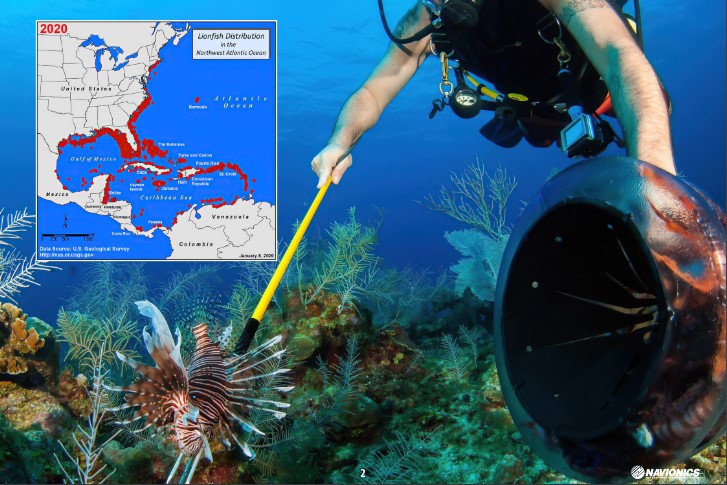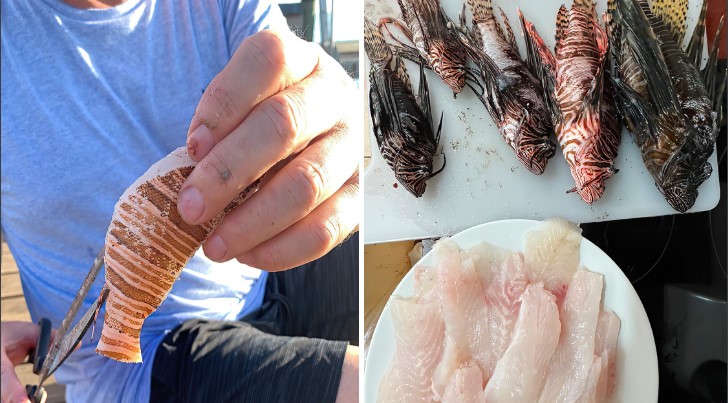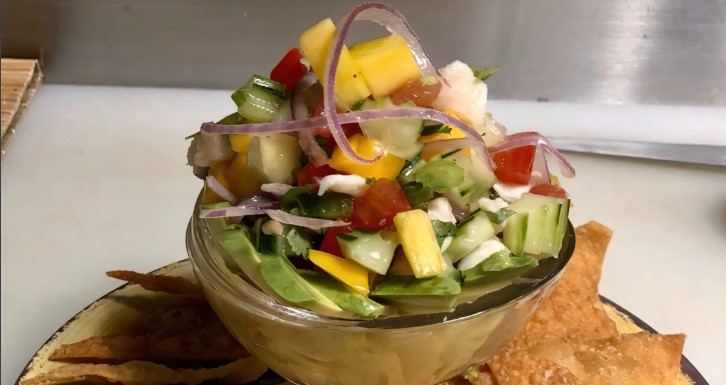The annual Emerald Coast Open Lionfish Tournament™, a tournament founded in 2019 and dedicated specifically to the removal of the invasive lionfish, is right around the corner. The main event will take place in Destin, Fla. May 17-18, with the support of many national and international conservation-minded organizations, such as Yamaha Rightwaters™. The annual event set records for largest lionfish (five times) as well as the number of lionfish caught in both the pre-tournament and main tournament. In 2023, 144 competing divers removed 24,699 invasive lionfish from the Gulf of Mexico.
Participation in the 2024 tournament is open to anyone who wishes to register. To learn more about the Emerald Coast Open and the events surrounding the two-day tournament, or to register, visit https://emeraldcoastopen.com/.

It’s not known for certain how the invasion of lionfish began back in the 1990s. It may have happened when a tropical fish collector let a few fish escape in South Florida or it could have happened during Hurricane Andrew in 1992 when a ship carrying them capsized. Genetic testing reveals the fish swimming in Atlantic, Gulf, and Caribbean waters can be traced to just three fish. Lionfish reach maturity in one year and females can release around two million eggs per year, or nearly 17,000 eggs every three days.
With no known predators thanks to its array of venomous spines and coloration that warns other fish of its danger, lionfish can grow to be 18 inches long and can live up to 30 years. Whatever the origin, the population of lionfish has exponentially exploded and these voracious feeders and prolific breeders threaten reefs and local waters from Brazil to New York by eating local fish and the food supply they eat.

So far, the only vulnerabilities lionfish have shown are that they are delicious and easy to catch, making their only predators humans. And efforts are being made on many fronts to encourage and enable recreational and commercial divers to take as many as possible. While we may never eradicate them, efforts like the Emerald Coast Open Lionfish Tournament™, help raise awareness and educate the public of the dangers of this invasive species. According to the event chairman, Alex Fogg, lionfish prey on more than 167 different native fish species and can reduce some reef fish populations by up to 90 percent. They are capable of eating fish 2/3 their size and one lionfish can consume roughly 20 fish in a half hour.
How to Catch Lionfish
While lionfish are eating machines, they are curiously hard to take by traditional fishing methods so spearing or using a pair of hand nets are the best ways to catch them. In deep water, traps are effective. Most divers use a three-pronged Hawaiian sling spear and shoot them in the head to preserve the meat. The best technique is to shoot from slightly behind the fish so the prongs don’t penetrate to the rear of the fish. A 4-foot-long spear is the best choice. Harvested fish are then transferred to a secure holding container. The best time to catch them in the open is at dusk and dawn. During midday, they like to hide under overhangs or inside barrel sponges. Those who use hand nets should wear puncture-proof hand protection like gloves to prevent getting stabbed by the prodigious array of spines that contain a venom akin to snake venom that is very painful and can lead to serious complications. If stung, the best treatment is to immerse the wound in hot water, which breaks down the venom. If diving using scuba, a pair of clear vinyl-sided nets with a mesh bottom can be very effective but require the diver to move slowly as they bring the open ends of the nets together to trap the lionfish. A mesh landing net and bait net used together are better for snorkelers because they have less resistance when moving through the water. A great video on techniques for capture and handling can be found at @wespeakfishreef.

How to Clean and Cook Lionfish
Now the good part: the eating. Lionfish have mild, firm, white meat that lends itself to a wide variety of cooking methods. Because of its taste and texture, it makes good sashimi or sushi and is an excellent candidate for ceviche (see attached recipe). It has a similar taste and texture to snapper or hogfish, which are two of the best-eating fish in the sea and it is this trait that gives environmentalists hope that the population can be controlled. Just don’t overcook the fish or it becomes dry and mealy.
For those who love seafood and have access to a boat, lionfish are a reliable and responsible way to put food on the table because they are one of the few fish species that has no bag limit. You could bring hundreds to the dock and would receive nothing but praise should you be stopped by a marine patrol officer.
Handling lionfish just after capture is similar to other fish. The best method to produce snow-white meat is to bleed it (not needed when spearing them) and immerse them in briny ice water. The first thing to do when cleaning them is to cut off the spines with poultry shears or garden clippers and carefully discard them because detached spines still have venom. Once the spines are gone there is no more venom to worry about and they can be cleaned like any other fish.
Catching Lionfish in Florida has Added Benefits
Florida Fish and Wildlife Conservation Commission will host its tenth annual Lionfish Challenge beginning May 24. This summer-long tournament is open to everyone and is completely free to enter. Participants in the Lionfish Challenge have removed over 1 million lionfish fromFlorida waters since the program began in 2014 Are you up for the Challenge? Visit FWCReefRangers.com to register for the Lionfish Challenge.
Other Lionfish Removal Events
Throughout the year, many events are being held to promote and reward the removal of lionfish. In Florida alone, from 2014-2021, there have been 170 tournaments, which led to the removal of more than 146,000 lionfish. Here are some of the larger ones: The Florida Fish and Wildlife Conservation Commission designated the Saturday following Mother’s Day each year as Florida Lionfish Awareness and Removal Day. The Florida Keys Lionfish Derby is being held August 18, 2024, headquartered in Islamorada.

Lionfish Ceviche Recipe
Courtesy of Hog Snappers Restaurant
4 oz lionfish
2 oz cup of slice red onion
2 oz cup of diced tomatoes
2 oz cup of diced cucumber
2 oz cup of diced mango1/4 of avocado
Cilantro
Jalapeños to taste
2 oz fresh squeeze lemon juice
Salt and pepper to taste
1/2 squeezed fresh orange
Note: Add lionfish, lemon juice, salt and pepper. Let sit until desired marination. Add the rest of the ingredients to the fish mixture and serve immediately.
Back to Blue Life
Participation in the 2024 tournament is open to anyone who wishes to register. To learn more about the Emerald Coast Open and the events surrounding the two-day tournament, or to register, visit https://emeraldcoastopen.com/.

It’s not known for certain how the invasion of lionfish began back in the 1990s. It may have happened when a tropical fish collector let a few fish escape in South Florida or it could have happened during Hurricane Andrew in 1992 when a ship carrying them capsized. Genetic testing reveals the fish swimming in Atlantic, Gulf, and Caribbean waters can be traced to just three fish. Lionfish reach maturity in one year and females can release around two million eggs per year, or nearly 17,000 eggs every three days.
With no known predators thanks to its array of venomous spines and coloration that warns other fish of its danger, lionfish can grow to be 18 inches long and can live up to 30 years. Whatever the origin, the population of lionfish has exponentially exploded and these voracious feeders and prolific breeders threaten reefs and local waters from Brazil to New York by eating local fish and the food supply they eat.

So far, the only vulnerabilities lionfish have shown are that they are delicious and easy to catch, making their only predators humans. And efforts are being made on many fronts to encourage and enable recreational and commercial divers to take as many as possible. While we may never eradicate them, efforts like the Emerald Coast Open Lionfish Tournament™, help raise awareness and educate the public of the dangers of this invasive species. According to the event chairman, Alex Fogg, lionfish prey on more than 167 different native fish species and can reduce some reef fish populations by up to 90 percent. They are capable of eating fish 2/3 their size and one lionfish can consume roughly 20 fish in a half hour.
How to Catch Lionfish
While lionfish are eating machines, they are curiously hard to take by traditional fishing methods so spearing or using a pair of hand nets are the best ways to catch them. In deep water, traps are effective. Most divers use a three-pronged Hawaiian sling spear and shoot them in the head to preserve the meat. The best technique is to shoot from slightly behind the fish so the prongs don’t penetrate to the rear of the fish. A 4-foot-long spear is the best choice. Harvested fish are then transferred to a secure holding container. The best time to catch them in the open is at dusk and dawn. During midday, they like to hide under overhangs or inside barrel sponges. Those who use hand nets should wear puncture-proof hand protection like gloves to prevent getting stabbed by the prodigious array of spines that contain a venom akin to snake venom that is very painful and can lead to serious complications. If stung, the best treatment is to immerse the wound in hot water, which breaks down the venom. If diving using scuba, a pair of clear vinyl-sided nets with a mesh bottom can be very effective but require the diver to move slowly as they bring the open ends of the nets together to trap the lionfish. A mesh landing net and bait net used together are better for snorkelers because they have less resistance when moving through the water. A great video on techniques for capture and handling can be found at @wespeakfishreef.

How to Clean and Cook Lionfish
Now the good part: the eating. Lionfish have mild, firm, white meat that lends itself to a wide variety of cooking methods. Because of its taste and texture, it makes good sashimi or sushi and is an excellent candidate for ceviche (see attached recipe). It has a similar taste and texture to snapper or hogfish, which are two of the best-eating fish in the sea and it is this trait that gives environmentalists hope that the population can be controlled. Just don’t overcook the fish or it becomes dry and mealy.
For those who love seafood and have access to a boat, lionfish are a reliable and responsible way to put food on the table because they are one of the few fish species that has no bag limit. You could bring hundreds to the dock and would receive nothing but praise should you be stopped by a marine patrol officer.
Handling lionfish just after capture is similar to other fish. The best method to produce snow-white meat is to bleed it (not needed when spearing them) and immerse them in briny ice water. The first thing to do when cleaning them is to cut off the spines with poultry shears or garden clippers and carefully discard them because detached spines still have venom. Once the spines are gone there is no more venom to worry about and they can be cleaned like any other fish.
Catching Lionfish in Florida has Added Benefits
Florida Fish and Wildlife Conservation Commission will host its tenth annual Lionfish Challenge beginning May 24. This summer-long tournament is open to everyone and is completely free to enter. Participants in the Lionfish Challenge have removed over 1 million lionfish fromFlorida waters since the program began in 2014 Are you up for the Challenge? Visit FWCReefRangers.com to register for the Lionfish Challenge.
Other Lionfish Removal Events
Throughout the year, many events are being held to promote and reward the removal of lionfish. In Florida alone, from 2014-2021, there have been 170 tournaments, which led to the removal of more than 146,000 lionfish. Here are some of the larger ones: The Florida Fish and Wildlife Conservation Commission designated the Saturday following Mother’s Day each year as Florida Lionfish Awareness and Removal Day. The Florida Keys Lionfish Derby is being held August 18, 2024, headquartered in Islamorada.

Lionfish Ceviche Recipe
Courtesy of Hog Snappers Restaurant
4 oz lionfish
2 oz cup of slice red onion
2 oz cup of diced tomatoes
2 oz cup of diced cucumber
2 oz cup of diced mango1/4 of avocado
Cilantro
Jalapeños to taste
2 oz fresh squeeze lemon juice
Salt and pepper to taste
1/2 squeezed fresh orange
Note: Add lionfish, lemon juice, salt and pepper. Let sit until desired marination. Add the rest of the ingredients to the fish mixture and serve immediately.
Back to Blue Life
